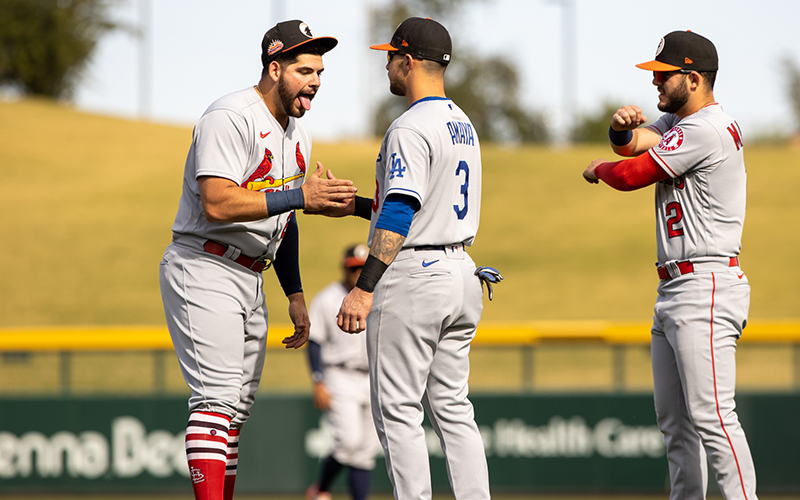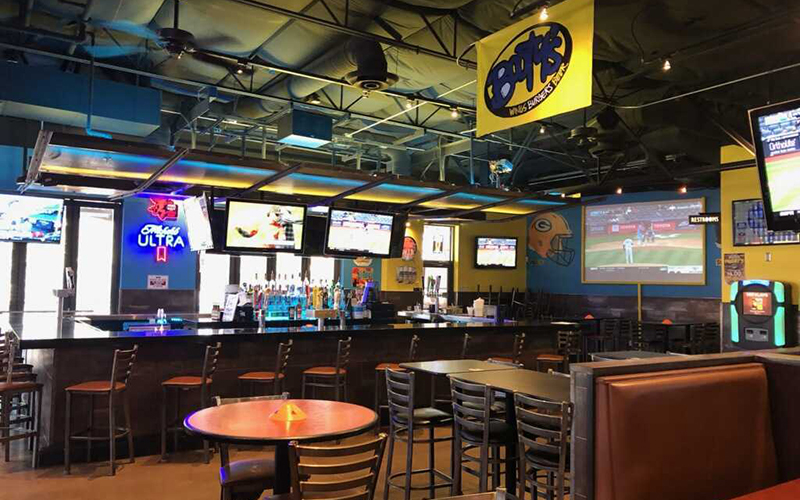
Baseball players enjoy the experience of competing and bonding with other teams, but the challenge of finding affordable housing has long been an issue for minor leagues who come to the Valley. (Photo by James Franks/Cronkite News)
PHOENIX – The news that MLB owners will provide housing to an estimated 90% of eligible minor league players, including those participating in extended spring training and the Arizona Complex League, was well received by players and advocates who have worked to change how minor leaguers are treated.
“It’s huge news. It’s going to help a lot of guys who don’t have the income to support families back home,” said Canaan Smith-Njigba, a Pirates prospect playing in the Arizona Fall League. “Hopefully, MLB will put some more money in our pockets income-wise and that’s the next step. Especially during the season because it’s really tough. I’m thankful MLB is helping us there. Right now, I’m happy we got something for us.”
But there’s plenty that still needs to be addressed.
Players and advocates alike have spoken out against MLB’s track record of not providing affordable equipment or food to minor leaguers. There’s also the issue of fair pay: The majority of players make between $8,000 to $15,000 a season, meaning most players hover around the federal poverty threshold for 2021.
There’s a larger issue that plagues minor league baseball, and that’s the knowledge that players aren’t treated well enough, and “teams are reluctant to make a change” to treat minor leaguers like full-time employees and humans, like they do in MLB, said Jeremy Wolf, the director of outreach for More Than Baseball, an organization that strives to provide resources to help minor leaguers.
MLB took over minor league operations last October, when the contract between the two leagues, which operated independently, expired. Thursday’s housing announcement is the latest in MLB’s changes to the minor league system, including a restructuring of the teams and leagues that comprise minor league baseball and a pay increase for players.
The statement released by MLB said the policy will provide minor leaguers with housing at every level of the minors “with limited exceptions,” including players with existing Major League Uniform Player Contracts or those who are slated to earn a six-figure salary over a full season.
Another major development for minor leaguers is that leases are no longer permitted. Previously, players were responsible for their own housing and leases. If a player was promoted or demoted, they were forced to handle the burden of multiple leases.
“The owners went into our first season modernizing the player development system focused on addressing longstanding issues that have impacted Minor League players for decades,” said Morgan Sword, MLB’s Executive Vice President of Baseball Operations, in the statement. “This step forward recognizes that the unprecedented nature of the past two years has further exacerbated affordable housing challenges across the country that existed before the pandemic.
The owners are confident that this investment will help ensure that Minor League players have every opportunity to achieve their dreams of becoming Major Leaguers.”
The policy sounds like a win for every player and advocate who has worked hard to redesign the minor leagues into an organization that prioritizes players and prepares them to be successful in MLB.
A statement from Harry Marino, executive director of Advocates for Minor Leaguers and a former minor leaguer with the Diamondbacks and Orioles, read, in part, “This is a historic victory for players, who forced the league’s hand by speaking up throughout the 2021 season. Let there be no mistake: this victory is the product of collective action by players.”
Wolf said the organization approves the owners’ decision to provide team housing to players.
“When there are advancements in things, we are happy. We know that things could always be better,” said Wolf, who played in the minor leagues with the Mets. “We know that the treatment of players can always be better, but this is a new start in this area.”
And, in MLB’s statement, Sword touted the changes owners have made since taking over minor league operations: “Owners increased salaries from 38-72% for 2021, improved facilities, provided more amenities and better clubhouse conditions, removed all clubhouse dues, and reduced in-season travel with better geographical alignment,” Sword said.
“What is the purpose of the poor treatment of players? Clearly minor league players are in an environment that is not conducive to their performance and development and they’re in an environment that pays them very little, that doesn’t treat them as full time employees, that doesn’t provide them with every opportunity possible to succeed,” Wolf said. “So when a team or the league goes, ‘Hey, we’re gonna pay players more.’ Well, that’s good. It’s a recognition of the problem, but then you look at their proposed solution, and it’s 10 or 20 or 50%. But that’s $15,000 a year instead of $12,000 a year. In press releases, it says a 35% increase, but in reality, it’s a $3,000 increase. It’s an interesting game of almost cat and mouse.”
Organizations like More Than Baseball and Advocates for Minor Leaguers, among others, exist to help minor leaguers because help doesn’t come from the teams. And any advancements that are agreed to move at a “snail’s pace,” Wolf said.
The treatment of players impacts their decisions on whether to pursue their dream of a MLB career or not. Kieran Lovegrove, who last played in the Angels minor league system, is an outspoken advocate for changing the way minor leaguers are treated. In a tweet, Lovegrove said that the work isn’t done until MLB and minor league baseball address what he calls the four pillars of success for athletes: sleep, hydration, nutrition and mental health.
Lovegrove spoke to ESPN in July about the struggles minor league players face when most of them make less than $15,000 per season. The average monthly rent for a one-bedroom apartment was about $1,098 a month in 2020. And, as ESPN reported, an individual can’t meet basic needs if they earn less than $26,225 a year anywhere in the U.S.
Marino said minor leaguers had no formal say in the housing plan (which isn’t abnormal, as minor league baseball has no player’s association or formal group to advocate for their needs). Many minor leaguers just picked up a second or third job for the offseason, as they do every year, to supplement the salary they only receive during the season. And they are still responsible for their own training expenses in the offseason.
“In short, housing is just one aspect of MLB’s fundamentally flawed Minor League system,” Marino said. “As we head into the 2022 season, Minor League players remain committed to working together to improve their working conditions through all means available, until at last players obtain the seat at the table that all workers deserve.”
-Edwin Perez contributed to this story.


